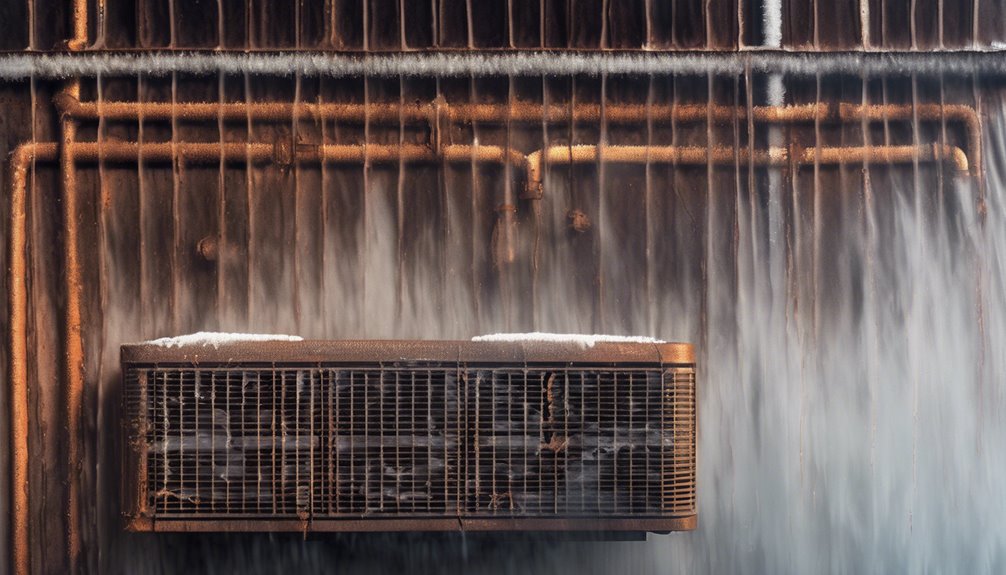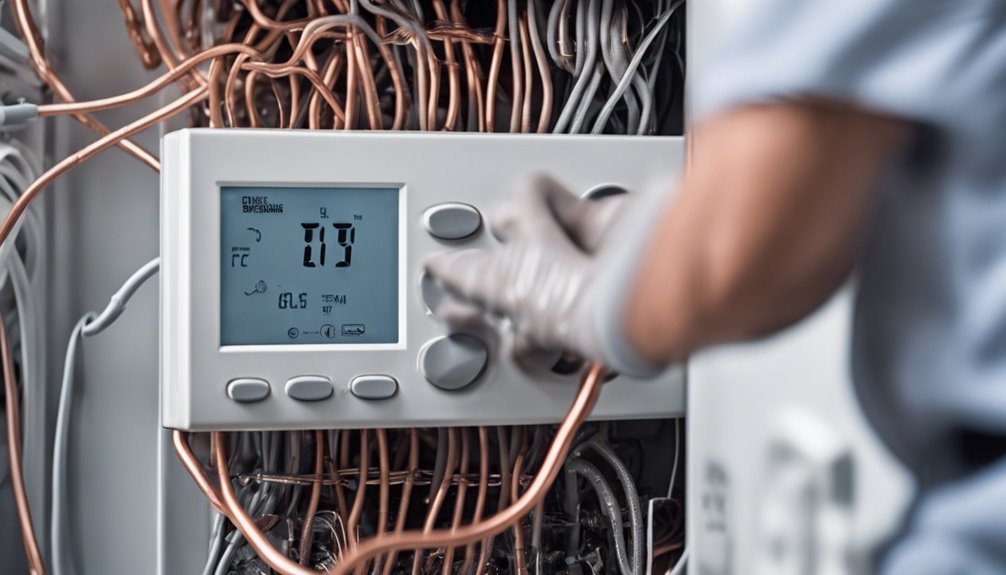If you notice your AC is making hissing sounds or unusual noises, it may be a sign of refrigerant gas leakage. You might also spot ice buildup and frost around the coils, or feel warm air blowing from the vents. Increased humidity and condensation, or unexplained spikes in your energy bills, could also indicate a leak. If you're experiencing any of these issues, it's time to investigate further – your AC's performance, and even your safety, might depend on it.
Key Takeaways
- Unusual noises like hissing sounds or ice buildup around coils can indicate refrigerant gas leakage in your AC.
- Weak or intermittent airflow, warm air blowing from vents, and increased humidity are signs of refrigerant gas leakage.
- Unexplained increases in energy bills, air pressure drops, and temperature fluctuations can signal refrigerant gas leakage.
- If your AC takes longer to cool the space, has reduced cooling effect, or has vents not blowing, it may be due to refrigerant gas leakage.
- Pay attention to ice accumulation on evaporator or condenser coils, as it can cause the AC to malfunction due to refrigerant gas leakage.
Hissing Sounds and Unusual Noises
When you turn on your air conditioner or refrigeration unit, do you hear hissing sounds or unusual noises coming from the vents or compressor area?
These noises can be signs of refrigerant gas leakage. Gas escapes from the system can create distinct noise patterns that are often audible.
If you notice hissing, gurgling, or bubbling sounds, it may indicate a refrigerant leak. The hissing sound is usually a high-pitched noise that's consistent with the pressure of the escaping gas.
Hissing, gurgling, or bubbling sounds may signal a refrigerant leak, with high-pitched hissing noise indicating escaping gas pressure.
Pay attention to these unusual noises, as they can be an early warning sign of a refrigerant leak. Ignoring these signs can lead to further damage and safety risks.
Ice Buildup and Frost Around the Coils
Ice buildup and frost around the coils are visual signs of refrigerant gas leakage that you shouldn't ignore.
When you notice frost patterns on the coils, it's a clear indication that the refrigerant is leaking and the AC is working harder to cool.
During a coil inspection, look for ice accumulation on the evaporator coils or the condenser coils. This buildup can cause the AC to malfunction, increase energy bills, and even lead to compressor failure.
Don't delay; address the issue promptly to prevent further damage. A professional technician can detect the leak, repair it, and recharge the system to ensure your AC runs efficiently and effectively.
Warm Air Blowing From the Vents
Your air conditioning system is supposed to blow cool, refreshing air through the vents, but if you're feeling warm air instead, it's a sign that something's amiss.
This can be a major issue, especially during the peak of summer when you rely on your AC for comfort.
When warm air blows from the vents, it's an indication that your system is struggling to circulate cool air effectively.
Poor air circulation can lead to a decrease in summer comfort, making your home feel stuffy and uncomfortable.
If you notice warm air blowing from the vents, it's essential to investigate the issue further, as it could be a sign of refrigerant gas leakage.
Increased Humidity and Condensation
You start to notice water droplets forming on windows and walls, which can lead to foggy windows that obstruct your view.
Meanwhile, moisture accumulates fast, causing condensation to build up in areas you never thought possible.
These signs of increased humidity and condensation are telltale indicators that refrigerant gas might be leaking from your system.
Water Droplets Forming
Water droplets forming on the walls, floor, or ceiling around your refrigerator or air conditioner can be a telltale sign of refrigerant gas leakage. You might notice this especially in areas with high humidity levels, where condensation patterns are more pronounced. When refrigerant leaks, it can cause moisture to accumulate, leading to water droplets forming on surfaces.
| Symptom | Description |
|---|---|
| Water droplets | Forming on walls, floor, or ceiling around your AC or fridge |
| Increased humidity | Higher humidity levels in the surrounding area |
| Condensation patterns | More pronounced condensation on surfaces, especially in humid areas |
Keep in mind that water droplets forming due to refrigerant gas leakage can lead to more severe issues, such as mold growth and structural damage. It's essential to address this issue promptly to avoid further complications.
Foggy Windows Appear
Foggy windows in your home or office can be a clear indication of refrigerant gas leakage from your air conditioner or refrigerator.
When refrigerant leaks, it releases moisture into the air, causing foggy conditions. You may notice this more when you're running your AC or fridge.
To confirm, inspect your windows for fogging, and check if it's more pronounced near the appliance.
- Foggy windows can be a sign of refrigerant gas leakage, as it increases humidity and condensation.
- Perform regular window inspection to catch any fogging issues early.
- Check for other signs of refrigerant leakage, such as hissing sounds or ice buildup.
- Foggy causes can be misleading, so it's essential to rule out other possible explanations, like high humidity or poor ventilation.
- Don't ignore foggy windows, as they can lead to further damage and health risks if left unchecked.
Moisture Accumulates Fast
The air in your home or office can quickly become heavy with moisture when refrigerant gas leaks from your air conditioner or refrigerator, leading to increased humidity and condensation.
You might notice that your walls, ceiling, or floors start to sweat, and moisture accumulates fast. This quick saturation causes condensation to form rapidly, often resulting in water droplets or puddles.
Fast condensation can also lead to mold growth, musty odors, and structural damage. If you notice these signs, it's essential to investigate the source of the moisture and address the refrigerant gas leak promptly to prevent further damage and health risks.
Unexplained Increases in Energy Bills
Frequently, homeowners are caught off guard by sudden spikes in their energy bills, leaving them scrambling to identify the culprit behind the unexpected increase.
You might be wondering what's driving up your energy costs, especially if you haven't experienced any changes in your billing trends or usage habits.
It's time to take a closer look at your AC's performance.
- Your AC is working harder to cool your space, resulting in increased energy consumption.
- Leaks in the refrigerant can cause your AC to run longer, leading to higher energy bills.
- Inefficient cooling can lead to longer cooling cycles, further driving up energy costs.
- An energy audit can help you identify areas of inefficiency in your AC system.
- Ignoring the issue can lead to even higher energy bills and potential system failure.
Weak or Intermittent Airflow From the Vents
When you turn on your AC, you expect a refreshing blast of cool air from the vents.
But if you're noticing a weak or intermittent airflow, it may be a sign of refrigerant gas leakage.
You might experience a drop in air pressure, vents that aren't blowing as they should, or a reduced cooling effect, which can make your space uncomfortable.
Air Pressure Drop
Air pressure drops can be a sneaky sign of refrigerant gas leakage, and you mightn't even notice it at first.
As air leaks from your AC system, pressure fluctuations occur, causing the air pressure to drop. This can lead to weak or intermittent airflow from the vents, making your home feel warm and uncomfortable.
- Pressure drops can cause your AC to work harder, increasing energy bills and reducing the system's lifespan.
- Air leaks can allow moisture to enter the system, leading to mold growth and further damage.
- Pressure fluctuations can also cause the compressor to fail prematurely.
- A drop in air pressure can lead to frozen coils, reducing airflow and cooling performance.
- If left unchecked, air leaks can lead to a complete system failure, requiring costly repairs or even replacement.
Vents Not Blowing
Your air conditioning vents should be blowing cool air consistently, but if you notice weak or intermittent airflow, it's a sign that something's amiss.
You might think it's just a minor issue, but weak airflow can be a symptom of a larger problem, like refrigerant gas leakage.
Check if your vents need cleaning – dirty vents can restrict air circulation and reduce airflow. Ensure that your vents are free from blockages and obstructions.
If cleaning and clearing the vents don't improve airflow, it may indicate a more serious issue. Don't ignore this sign, as it could lead to further damage and increased energy bills.
Reduced Cooling Effect
If you're still experiencing weak airflow despite cleaning and clearing your vents, it's likely that the issue lies elsewhere.
One possible explanation is a reduced cooling effect, which can be a sign of refrigerant gas leakage. This can lead to a decrease in your AC's cooling capacity, making it harder to cool your space.
Some common signs of reduced cooling effect include:
- Temperature fluctuations in different areas of your home
- Increased energy bills despite regular usage
- Your AC taking longer to cool your space
- A hissing or bubbling sound coming from the vents
- Ice or frost buildup on the coils or vents
Frequently Asked Questions
Can I Fix a Refrigerant Leak Myself?
You're wondering if you can fix a refrigerant leak yourself, but without proper training and a DIY toolkit, it's risky. It's recommended to seek professional assistance to ensure a safe and effective repair, avoiding further damage and potential harm.
How Long Does It Take to Detect a Refrigerant Leak?
You'll likely need specialized tools like refrigerant sniffers or leak detectors to detect a refrigerant leak, which can take anywhere from a few minutes to several hours, depending on the severity and location of the leak.
Is a Refrigerant Leak Harmful to My Health?
You're exposed to refrigerant poisoning if you inhale leaked gas, which can cause toxic exposure, leading to headaches, dizziness, and nausea; in severe cases, it can be fatal, so it's crucial you ventilate the area and seek medical help immediately.
Can a Refrigerant Leak Cause a Fire?
You're right to worry about fire risks: a refrigerant leak can spark a fire when it mixes with air and comes into contact with electrical sparks or open flames, creating a hazardous situation that demands immediate attention.
Will a Refrigerant Leak Void My AC Warranty?
You're wondering if a refrigerant leak will void your AC warranty. Typically, it won't, but you'll need to check your warranty terms. Manufacturer obligations usually cover repairs, but neglecting maintenance or ignoring issues might impact warranty implications.
Conclusion
You've noticed some weird things going on with your AC, and you're worried it might be a refrigerant gas leak. Don't ignore these signs! If you've heard hissing sounds, seen ice buildup, or felt warm air blowing from the vents, it's time to take action. Increased humidity, high energy bills, and weak airflow are also red flags. Don't wait until it's too late – call a professional to inspect your AC unit and fix any leaks before they cause more damage.



